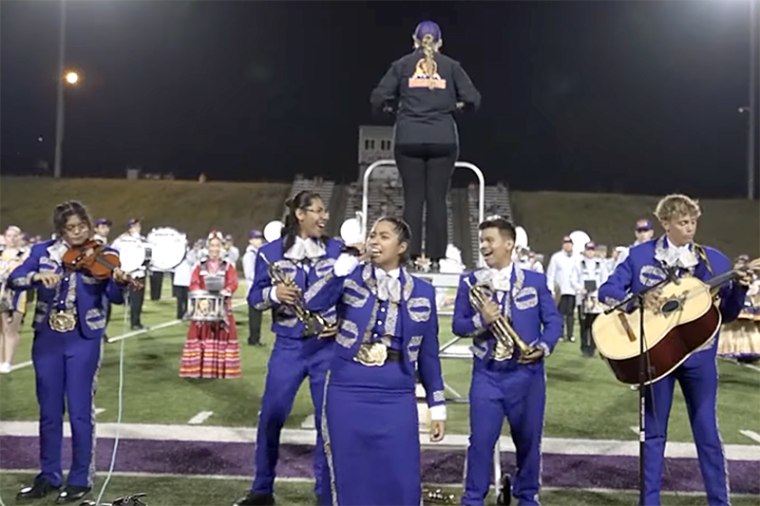Iowa high school senior Miranda Estrada is a star student, a trumpet player and a drum major for the school’s marching band. She’s also part of an extracurricular group that, 20 years ago, would have seemed unusual to find in a small Iowa town: A mariachi group called Reyes del Oeste.
“I grew up listening to mariachi, and it has always been a huge part of my life,” said Estrada, a first-generation student whose parents came to the United States from Mexico 18 years ago. “To me, Reyes del Oeste is like family.”
For Estrada and her peers, mariachi is more than just an extracurricular. At her high school in Denison, Latinos made up 68% of the student body in the 2022-2023 school year. That number is reflective of the city at large, whose Latino community has been growing for years and finally feels represented in the halls of Denison High School.

Ruben Newell, the school’s band director, said changing demographics in the student body forced him to consider how he could create a program that would better meet their needs.
“When I first started here in 2009, it was really obvious. I’d walk in the hallway and look at the student body, and then I’d get in front of the band in the band room and there was a disconnect,” said Newell, who is not Latino. “It definitely didn’t look the same.”
That’s when he decided to look into mariachi. “It became kind of the easy answer to help try to shift the demographics in our program,” Newell said. He now often turns to his students to help drive decisions about song choices and other aspects of the band.
As of 2020, Latinos accounted for 6.8% of Iowa’s overall population and nearly 50% of Denison’s population of 8,000. In the next two-and-a-half decades, that number is expected to double to 12% statewide, echoing the growth of the Hispanic population nationwide.
Janet Castillo, a guitar player in the school’s mariachi program, said mariachi is a way for students of Mexican origin to share a part of their identity with the community. “They see a lot of Hispanics here, but they’re like, ‘What is their culture about?’” said Castillo. “My favorite part is being to showcase a culture to everyone in the community.”
The mariachi program at Denison High School is now in its 13th year. Interest in the group is high and achieving a spot is competitive.
“Reyes del Oeste gets a lot of people that auditioned for it because they’re like, ‘Wow, that’s my culture. That’s part of me and I want to be a part of that,’ and I think that’s one of the greatest parts of it,” said Maite Arreola, a senior violinist in Reyes del Oeste.
An important component of being in the band is embracing the “trajes de charro” (the charro suits), known simply as trajes, which are a staple uniform among mariachi band players. Trajes come with traditional expectations, including wearing long hair up so it does not touch the uniform. Mariachi members also cannot eat while wearing a traje. Traditionally, women wear long skirts, but some female members of Reyes del Oeste opt to wear matching pants.
For students at Denison, trajes signify hard work and dedication.
“When I put on that traje I feel pride. I feel happy to go to Denison High School. I feel happy to be in mariachi Reyes del Oeste,” said Estrada.
The band is now so well known in the community that Newell says he fields calls and e-mails from community members eager to book the students for paid performances at quinceañeras and weddings. “We’re constantly getting a barrage of people who want them to perform,” said Newell.
While they do not accept requests, the interest speaks to Reyes del Oeste’s role as a community symbol for Denison. When the band plays at community events, halftime performances at sporting matches and the annual Fiesta Mariachi fundraiser, the community shows up, too.
“Once we start playing, you hear gritos from the crowd,” said Arreola, using the Spanish word for screams. “I’m playing for people that want to hear us and I’m playing for people that are part of our community, and that’s one of the reasons I love music so much, is you can connect with your community.”



